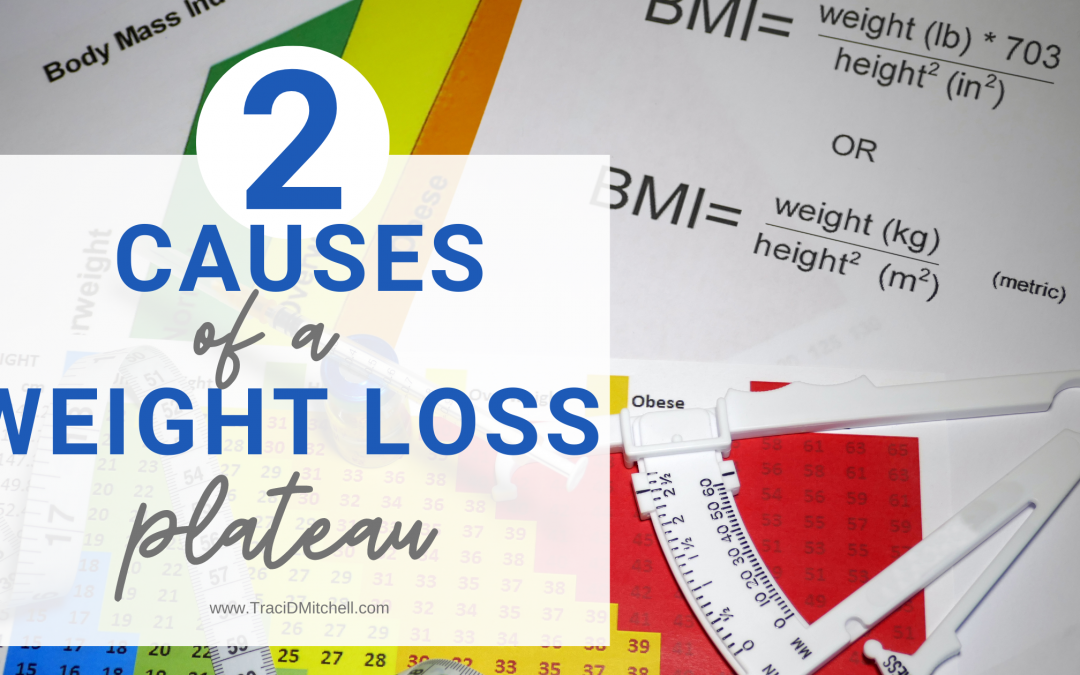
What Causes a Weight Loss Plateau?
What causes a weight loss plateau? It’s a question that pops up in the minds of many on their weight loss journey. We all get excited about those initial pounds dropping, but then, suddenly, the scale seems to stall. It’s like hitting a brick wall.
While it can be frustrating, understanding the reasons behind this plateau can help you navigate it and keep moving towards your goals.
Weight loss plateaus occur due to a complex interplay of physiological factors, including metabolism, hormones, and even your daily habits. As your body adapts to the changes, it becomes more efficient at burning calories, making it harder to shed those extra pounds.
This is where understanding the science behind plateaus and developing a strategic approach can make all the difference.
Understanding Weight Loss Plateaus

Hitting a weight loss plateau is a common experience for many individuals trying to shed pounds. This frustrating phenomenon occurs when your weight remains stagnant despite maintaining your diet and exercise routine. While it can be discouraging, understanding the underlying reasons behind weight loss plateaus can empower you to overcome them and continue your weight loss journey.
Physiological Mechanisms Behind Weight Loss Plateaus, What causes a weight loss plateau
Weight loss plateaus arise from a combination of physiological adaptations that occur as your body adjusts to a calorie deficit. These adaptations aim to conserve energy and maintain homeostasis, making it harder to continue losing weight at the same rate.
Role of Metabolism and Hormonal Changes
Metabolism plays a crucial role in weight loss plateaus. When you begin a weight loss program, your body initially burns more calories due to the increased energy expenditure from exercise and the calorie restriction. However, as your body adapts to this new energy balance, your metabolism slows down, leading to a decrease in calorie expenditure.
This metabolic adaptation is a natural protective mechanism to prevent your body from depleting its energy reserves.Hormonal changes also contribute to weight loss plateaus. As you lose weight, your body releases hormones such as leptin and ghrelin, which regulate appetite and metabolism.
Leptin, a hormone that signals fullness, decreases with weight loss, making you feel hungrier. Conversely, ghrelin, a hormone that stimulates appetite, increases, further promoting hunger. These hormonal shifts can make it challenging to maintain a calorie deficit and continue losing weight.
Hitting a weight loss plateau can be frustrating, but it’s often a sign your body has adapted to your routine. To keep things moving, consider tweaking your approach, especially during summer. Check out these healthy eating tips for summer to keep in track to find inspiration for new recipes and strategies.
By mixing things up and keeping your nutrition on point, you’ll likely overcome that plateau and keep progressing towards your goals.
Adaptive Thermogenesis
Adaptive thermogenesis is a physiological response that increases energy expenditure to compensate for a calorie deficit. This response occurs when your body senses a decrease in calorie intake and tries to maintain its energy balance. Adaptive thermogenesis can manifest in various ways, including:
- Increased activity levels, such as fidgeting or shivering
- Increased body temperature
- Increased metabolic rate
As your body adapts to the calorie deficit, adaptive thermogenesis becomes more efficient, making it harder to lose weight.
Common Causes of Weight Loss Plateaus
It’s frustrating to hit a weight loss plateau. You’re diligently following your diet and exercise plan, but the scale seems stuck. While it’s normal to experience plateaus during your weight loss journey, understanding the reasons behind them can help you overcome them and continue making progress.
Here are some of the most common causes:
Dietary Factors
Dietary factors play a crucial role in weight loss, and changes in your eating habits can significantly impact your progress.
- Calorie Deficit Reduction: When you start a weight loss program, you typically create a calorie deficit by consuming fewer calories than you burn. However, as you lose weight, your body needs fewer calories to maintain its current weight. If you don’t adjust your calorie intake accordingly, you may no longer be in a calorie deficit, leading to a plateau.
- Insufficient Protein Intake: Protein is essential for building and maintaining muscle mass, which helps boost your metabolism and burn more calories. If you’re not consuming enough protein, you may experience muscle loss, leading to a slower metabolism and a weight loss plateau.
Hitting a weight loss plateau is frustrating, but it’s often a sign your body has adapted to your current routine. To break through, consider tweaking your diet with more nutrient-dense choices. For example, if you’re craving Mexican food, try checking out healthy ways to order Chipotle to ensure you’re getting a satisfying meal without sabotaging your progress.
Ultimately, finding the right balance of calories and nutrients will help you break through the plateau and continue your weight loss journey.
- Macro Nutrient Imbalance: While overall calorie intake is important, the distribution of macronutrients (carbohydrates, protein, and fat) also affects weight loss. If you’re not consuming the right balance of macronutrients, you may not be getting the nutrients your body needs for optimal functioning and weight loss.
- Overconsumption of Processed Foods: Processed foods are often high in calories, sugar, and unhealthy fats, which can contribute to weight gain and hinder weight loss.
- Insufficient Fiber Intake: Fiber helps you feel full, promotes healthy digestion, and can regulate blood sugar levels. If you’re not consuming enough fiber, you may experience cravings and overeating, leading to a plateau.
Exercise Habits
Exercise is a vital component of weight loss, but changes in your exercise routine can also lead to plateaus.
- Decreased Exercise Intensity or Frequency: If you’re not challenging your body with regular and intense workouts, your metabolism may slow down, and you may burn fewer calories, leading to a weight loss plateau.
- Lack of Variety: Your body adapts to exercise routines over time, so it’s important to introduce variety to keep challenging your muscles and preventing plateaus.
- Overtraining: While exercise is essential, overtraining can have negative effects on your body, including increased cortisol levels, muscle fatigue, and reduced calorie expenditure.
Strategies to Overcome Plateaus: What Causes A Weight Loss Plateau

Hitting a weight loss plateau is frustrating, but it’s a common experience. It’s a sign that your body has adapted to your current routine and needs a change to continue shedding pounds. Don’t despair! By implementing strategic adjustments, you can break through the plateau and get back on track.
Hitting a weight loss plateau can be frustrating, but it’s a common part of the journey. Sometimes, our bodies adapt to our calorie intake and exercise routine, leading to a stall in progress. A great way to shake things up is by adding new, healthy foods to your diet, like these marinated mushroom sweet potato tacos.
They’re packed with flavor and nutrients, and the variety can help jumpstart your metabolism and break through that plateau. Remember, consistency is key, and finding enjoyable ways to eat healthy can make a big difference!
Adjusting Calorie Intake and Macro Ratios
A plateau often occurs when your body has reached a new set point. This means your body has adjusted its metabolism to maintain its current weight. To overcome this, you need to create a calorie deficit again. Adjusting calorie intake is a crucial step in breaking through a plateau.
The first step is to accurately track your daily calorie intake. You can use a food journal, calorie-tracking app, or online calculator. Once you know how many calories you’re currently consuming, you can start to make adjustments.
You can also adjust your macro ratios. This means changing the proportion of carbohydrates, proteins, and fats in your diet. For example, you might try increasing your protein intake to help you feel fuller for longer, which can reduce overall calorie consumption.
You can also adjust your macro ratios. This means changing the proportion of carbohydrates, proteins, and fats in your diet. For example, you might try increasing your protein intake to help you feel fuller for longer, which can reduce overall calorie consumption.
Increasing Exercise Intensity and Duration
Exercise plays a vital role in weight loss, and increasing its intensity and duration can help you break through a plateau. When you consistently exercise at the same level, your body becomes more efficient at burning calories. To challenge your body and boost your metabolism, try incorporating higher-intensity workouts or increasing the duration of your workouts.
You can also try new activities that engage different muscle groups.
Increasing exercise intensity and duration can help you break through a plateau. When you consistently exercise at the same level, your body becomes more efficient at burning calories. To challenge your body and boost your metabolism, try incorporating higher-intensity workouts or increasing the duration of your workouts. You can also try new activities that engage different muscle groups.
Lifestyle Factors and Plateaus
Lifestyle factors play a crucial role in weight management and can significantly impact the success of your weight loss journey. Even if you’re diligently following a well-structured diet and exercise plan, neglecting these aspects can lead to a weight loss plateau.
Sleep Deprivation and Weight Loss Plateaus
Sleep deprivation can disrupt hormonal balance, leading to increased hunger and cravings, particularly for high-calorie, processed foods. This is because lack of sleep increases the production of ghrelin, the hunger hormone, and decreases leptin, the hormone responsible for satiety. Consequently, you may find yourself consuming more calories than usual, hindering your weight loss progress.
- Studies have shown that sleep deprivation can increase the risk of weight gain and obesity. For instance, a study published in the journal “Sleep” found that individuals who slept less than six hours per night were more likely to gain weight over time than those who slept seven to eight hours.
- Sleep deprivation also affects the body’s metabolism. It can reduce the production of insulin, a hormone that regulates blood sugar levels, making it harder for the body to utilize energy efficiently. This can lead to increased fat storage and weight gain.
Stress and Its Influence on Weight Management
Chronic stress can lead to increased cortisol levels, a hormone that promotes fat storage, particularly in the abdominal area. Stress can also trigger unhealthy eating habits, such as emotional eating or binge eating, which can contribute to weight gain.
- Studies have shown that stress can increase cravings for high-fat, sugary foods, which are often comforting but not nutritious. This can lead to an imbalance in calorie intake and expenditure, hindering weight loss efforts.
- Stress can also disrupt sleep patterns, further contributing to weight gain. As mentioned earlier, lack of sleep can lead to hormonal imbalances that increase appetite and cravings.
Hydration Levels and Metabolic Processes
Adequate hydration is essential for optimal metabolic function. Water plays a vital role in various bodily processes, including digestion, nutrient absorption, and waste removal. Dehydration can slow down your metabolism, making it harder to burn calories and lose weight.
- Water helps to regulate body temperature and transport nutrients to cells. When you’re dehydrated, your body may struggle to perform these functions efficiently, potentially leading to a slower metabolism.
- Dehydration can also increase hunger and cravings, as the body may confuse thirst for hunger. This can lead to overeating and hinder weight loss efforts.
Addressing Plateaus with Professional Guidance

Sometimes, despite your best efforts, weight loss plateaus can be stubborn. In these situations, seeking professional guidance can be invaluable. Consulting experts in nutrition, fitness, and medicine can provide personalized strategies and support to overcome these challenges.
Consulting a Registered Dietitian or Nutritionist
Registered dietitians (RDs) and nutritionists are experts in food and nutrition. They can help you create a personalized meal plan that is tailored to your individual needs, preferences, and goals.
- Identifying Nutritional Deficiencies:RDs can assess your dietary intake and identify any potential nutritional deficiencies that may be hindering your weight loss progress. They can recommend supplements or dietary adjustments to address these deficiencies.
- Developing a Balanced Diet:RDs can help you create a balanced diet that provides all the necessary nutrients without exceeding your calorie needs. They can also provide guidance on portion control and mindful eating habits.
- Addressing Food Sensitivities:Some individuals may experience weight loss plateaus due to food sensitivities or intolerances. RDs can help identify these issues and recommend dietary modifications to alleviate them.
- Providing Ongoing Support:RDs can offer ongoing support and guidance as you work towards your weight loss goals. They can help you navigate challenges, address setbacks, and stay motivated.
Seeking Advice from a Certified Personal Trainer
Certified personal trainers (CPTs) are fitness professionals who can help you develop a personalized exercise program that is safe, effective, and enjoyable.
- Creating a Customized Exercise Plan:CPTs can assess your fitness level and goals and create a tailored exercise program that incorporates a variety of exercises to target different muscle groups.
- Ensuring Proper Form:CPTs can ensure that you are using proper form during exercises to maximize results and prevent injuries. They can provide feedback and modifications as needed.
- Motivating and Encouraging:CPTs can provide motivation and encouragement to help you stay consistent with your exercise routine. They can also help you set realistic goals and track your progress.
- Exploring New Activities:CPTs can introduce you to new and challenging exercises that can help you break through plateaus and continue to make progress.
The Role of a Medical Professional
While RDs and CPTs can provide valuable guidance, it is essential to consult with a medical professional if you are experiencing a weight loss plateau that is accompanied by other symptoms.
- Identifying Underlying Medical Conditions:A medical professional can rule out any underlying medical conditions that may be contributing to your weight loss plateau, such as thyroid disorders, hormonal imbalances, or metabolic disorders.
- Assessing Medication Interactions:Some medications can affect weight loss, and a medical professional can assess any potential interactions between your medications and your weight loss efforts.
- Providing Personalized Recommendations:Based on your medical history and individual needs, a medical professional can provide personalized recommendations for addressing your weight loss plateau, which may include lifestyle modifications, medication adjustments, or further testing.
Last Word
Navigating a weight loss plateau requires patience, persistence, and a bit of flexibility. Remember, it’s not about achieving instant results but about making sustainable changes that work for you. By understanding the underlying causes, adjusting your approach, and seeking professional guidance when needed, you can overcome these plateaus and continue on your journey to a healthier you.






